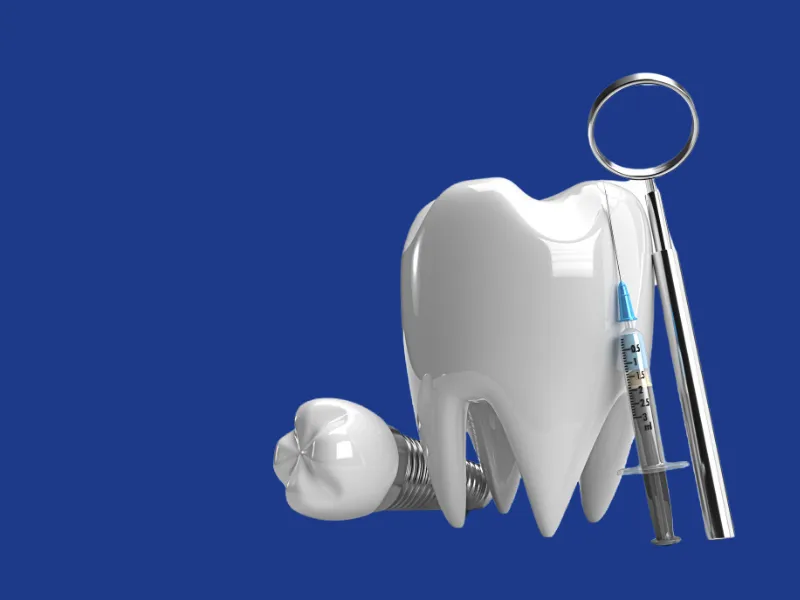Can Diabetics Get Dental Implants?
Published: 14 Apr 2025
You’ve lost a tooth and want it replaced, but you’re diabetic. You’ve heard mixed things. Some say implants are risky, others say they’re totally fine. So what’s the real answer to: Can diabetics get dental implants?
This post clears up the confusion with science-backed facts, personal stories, and expert advice. By the end, you’ll have a clear, confident answer based on real medical insight, not myths.
1- Can Diabetics Get Dental Implants?
Yes, diabetics can get dental implants, but only if their diabetes is well-managed. Sounds confusing? Don’t worry, I’ll make it easy for you.

In my clinical experience, I have noticed that uncontrolled blood sugar can slow healing and increase the risk of infection, which may cause implant failure. (1)
2- The Link Between Diabetes and Dental Health
Diabetes doesn’t just affect blood sugar; it impacts your mouth, too. If you’re diabetic, you may have noticed more gum bleeding, dry mouth, or slow healing after dental work. That’s not a coincidence. I know this can feel overwhelming, but let’s simplify it.

2.1 How Diabetes Affects Healing
High blood sugar makes it harder for your body to heal. Here’s why:
- Slower Blood Flow: Healing needs good circulation; high sugar thickens blood, which delays repair. (2)
- Weakened Immune Response: Your body can’t fight bacteria as effectively, raising the risk of infection. (3)
- Implant Concern: Dental implants need the bone to heal tightly around them. If healing is delayed, the implant might not “stick” properly.
2.2 Gum Disease Risk
People with poorly controlled diabetes often have:
- Inflamed, swollen gums
- Bleeding during brushing
- Persistent bad breath
- Loosening of teeth

These signs often point to periodontitis, a serious gum infection that can damage bone and tissues, making implants even riskier. (4)
Worried about post-op healing and sugar spikes? You might want to know how “cheat days” affect diabetic health.
| 3- Who Is a Good Candidate Among Diabetics? |
|---|
Just because you have diabetes doesn’t mean you can’t get dental implants. But not everyone with diabetes is the right fit either. So, who is a good candidate? 3.1 Ideal CandidatesIf you check these boxes, you’re likely a strong candidate:
3.2 Red Flags to Watch Out ForSome factors can seriously lower the chances of implant success:
In my experience, smokers with poorly controlled diabetes have a much tougher time healing after surgery. Even small wounds can become big problems. (5) 3.3 Pro TipAsk your dentist to coordinate with your endocrinologist. This team approach helps balance your blood sugar before and after the procedure, making success much more likely. |
4- How to Improve the Success of Implants with Diabetes
So, how can you boost your chances of success if you’re diabetic and considering dental implants? Here’s a simple breakdown:
4.1 Before Implant Surgery:
- Keep Blood Sugar Under Control
Your goal should be to keep your HbA1c below 7%. This shows that your blood sugar is stable, which helps your body heal better and faster after surgery. - Treat Gum Disease or Infections
Gum disease can delay healing and increase the risk of infection. Get any gum issues sorted before the implant procedure.
4.2 Aftercare Tips:
- Take Your Prescribed Antibiotics
These help prevent infection, especially in diabetic patients who are more prone to complications. - Follow-Up Visits Are a Must
Regular check-ups after your implant will help ensure everything’s healing as it should. Don’t skip them! - Avoid Smoking
Smoking slows down healing and increases the risk of implant failure, so it’s best to quit or avoid smoking after your surgery.

4.3 Diet Matters:
- Eat Soft Foods
Choose soft foods that won’t stress your new implant. Avoid hard or chewy foods in the early stages. - Manage Carbs to Keep Sugar Levels Stable
Stable blood sugar levels are essential. Try to manage your carbohydrate intake to avoid blood sugar spikes that could interfere with healing.

With these simple steps, you can significantly improve your chances of implant success!
While dental implants can be a great solution, diabetics need to be aware of certain risks and complications that can arise due to their condition. Here’s what to keep an eye on:
5.1 Slower Healing
High blood sugar levels can slow down the healing process. This means it might take longer for the gums and bone to fully heal after the implant is placed.
5.2 Risk of Implant Rejection (in Poorly Controlled Diabetes)
If your blood sugar isn’t well-controlled, your body might have a harder time accepting the implant, increasing the risk of rejection. I once had a patient who struggled with this. This is why keeping your diabetes under control is crucial.
5.3 Bone Loss Around the Implant
In diabetics, there’s a higher chance of bone loss around the implant site, which can lead to implant failure over time. Maintaining good oral hygiene and regular check-ups can help prevent this.
5.4 Infection at the Implant Site
Increased blood sugar can make it easier for infections to develop, including around the implant site. Following proper aftercare and taking antibiotics as prescribed can reduce this risk.
Being aware of these risks helps you take the right steps to minimize complications. Managing your diabetes and following your dentist’s advice are key to a successful dental implant journey!
6- Alternatives to Implants for Diabetics (If Not a Fit)
If dental implants aren’t the best option due to your diabetes or other health concerns, don’t worry! There are still several alternatives to restore your smile and chewing function. Here are some options:
- Dental Bridges
Dental bridges are a great option if you’re missing one or more teeth. They “bridge” the gap using adjacent healthy teeth for support. Unlike implants, they don’t require surgery, making them an easier choice for those with health concerns.
- Removable Partial Dentures
Partial dentures are another removable option that fills in the gaps left by missing teeth. They’re less invasive and can be customized to fit your mouth comfortably.
- Mini Implants (Less Invasive but Not for Everyone)
Mini implants are smaller versions of traditional implants. They’re less invasive and quicker to place, but they may not be suitable for everyone, especially if you have significant bone loss.
Talk to your dentist about which option best matches your oral and overall health. They can guide you to the right choice, whether it’s implants or one of these alternatives.
These alternatives can provide the functionality and aesthetic improvement you need while considering your diabetic health.
7-Real-Life Stories of Diabetics Getting Dental Implants
What Other Diabetics Say on Reddit…
- One user with Type 1 diabetes shared having multiple dental procedures, including root canals and crowns, without major issues. They recommended following the prescribed medications and felt that dental implants were a viable option if well-managed.
- Another user had two successful implants and was in the process of getting a third. He noted that he was given antibiotics post-surgery, which was different from what non-diabetic patients received, but they had no problems.
- Lastly, a user who had a dental implant over ten years ago reported no complications. Their implant are now indistinguishable from natural teeth, and their jawbone integrated perfectly with the post, even with diabetes.
These real-life stories show that dental implants can work for diabetics when managed properly. While concerns about infection and healing are valid, with the right care and close communication with your healthcare team, many diabetics have successful implant experiences.
Always consult both your dentist and endocrinologist to ensure the best outcome.
8- Conclusion
So, guys, in this article, we’ve covered the question: Can Diabetics Get Dental Implants? in detail. If you’re managing your diabetes well and your oral health is in good shape, implants can be a great option for you.
However, it’s important to work closely with both your dentist and endocrinologist to ensure the best outcomes. Don’t hesitate to reach out to a dental professional to explore your options and get personalized advice. Take action now and schedule a consultation today!
9-FAQs
Yes, people with Type 1 diabetes can get dental implants, but their success largely depends on how well their diabetes is managed. It’s important to maintain good blood sugar control, as high sugar levels can slow down healing and increase the risk of infection. Always consult both your dentist and endocrinologist to ensure you’re a good candidate.
Diabetes, especially if not well-managed, can slow down the body’s ability to heal after surgery. High blood sugar levels can impair immune function, increasing the risk of infection and delaying recovery. Good blood sugar control helps improve healing and reduces complications.
The success rate for dental implants in diabetics can be as high as 85-95%, especially with well-controlled blood sugar levels. However, poorly controlled diabetes can lower this success rate. The key to success is managing your diabetes and ensuring good oral health before surgery.
Yes, if diabetes is not well-managed, there can be complications like slower healing, infection, and even implant failure. Regular check-ups, proper diabetes management, and post-surgery care can help minimize these risks. It’s essential to follow all instructions given by your dentist and healthcare team.
To lower your risk, keep your blood sugar levels under control (preferably below 7%), follow all aftercare instructions, and attend regular dental check-ups. Avoid smoking, as it can further increase the risk of failure. A healthy diet and good oral hygiene will also help ensure the best outcome.
Healing time can vary, but for diabetics, it may take a bit longer than for those without diabetes. The healing process is slower if blood sugar levels aren’t well-controlled. Typically, you can expect the process to take a few months, but follow-up visits with your dentist will help monitor progress.
Yes, alternatives include dental bridges, removable partial dentures, or mini implants. These options may be more suitable if you’re not a good candidate for traditional implants due to diabetes or other health concerns. Talk to your dentist to determine the best alternative based on your health and needs.
If you have gum disease, it’s important to treat it before getting dental implants. Gum disease can lead to poor healing and implant failure. Your dentist may recommend a treatment plan for your gums before proceeding with the implants.
Smoking increases the risk of implant failure, especially for diabetics. It can interfere with healing, cause infection, and reduce blood flow to the gums, all of which can hinder the implant’s success. If you smoke, it’s strongly recommended to quit before undergoing dental implant surgery.
Yes, managing your diet is important, especially for diabetics. Eating a balanced diet that helps control your blood sugar can improve your chances of implant success. After surgery, stick to soft foods that won’t stress the implant and avoid sugary foods that can spike your blood sugar levels
10- References
At MedicaWire, all medically sensitive content is reviewed by licensed healthcare professionals. Our team ensures that the information you read is accurate, up-to-date, and based on trusted medical sources.
Learn how we maintain high standards by reading our Editorial Policy.
📚 Sources
- Success Rates of Dental Implants in Patients With Diabetes: A Systematic Review
https://pubmed.ncbi.nlm.nih.gov/39867008/ - Systematic review on diabetes mellitus and dental implants: an update
https://pmc.ncbi.nlm.nih.gov/articles/PMC8724342/ - Diabetes Mellitus and Dental Implants: A Systematic Review and Meta-Analysis
https://pmc.ncbi.nlm.nih.gov/articles/PMC9105616/ - Diabetes and oral implant failure: a systematic review
https://pubmed.ncbi.nlm.nih.gov/24928096/
ℹ️ Our Promise
MedicaWire follows strict sourcing guidelines and only references peer-reviewed studies, academic institutions, and reputable medical associations. We update content regularly to reflect new health information.

- Be Respectful
- Stay Relevant
- Stay Positive
- True Feedback
- Encourage Discussion
- Avoid Spamming
- No Fake News
- Don't Copy-Paste
- No Personal Attacks



- Be Respectful
- Stay Relevant
- Stay Positive
- True Feedback
- Encourage Discussion
- Avoid Spamming
- No Fake News
- Don't Copy-Paste
- No Personal Attacks




